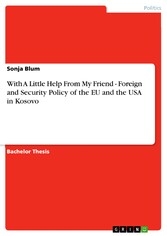Suchen und Finden
With A Little Help From My Friend - Foreign and Security Policy of the EU and the USA in Kosovo
Mehr zum Inhalt

With A Little Help From My Friend - Foreign and Security Policy of the EU and the USA in Kosovo
Bachelor Thesis from the year 2008 in the subject Politics - Region: Other States, grade: 2,3, University of Osnabrück, language: English, abstract: 'The Western Balkans, and in particular Kosovo, constitute an interesting area of study in the field political science and international relations in that, it not only brings into focus the development and evolution of the European Union (EU) since its inception, but also offers to define the transatlantic relationship between the European Union and the United States of America (USA). The Kosovo Conflict and the surrounding events throughout the Balkans have repeatedly demonstrated that the European Union still lacks the political, judicial and military competencies in its collective approaches to security and foreign policy. Since its inception, the EU had been, and continues to be greatly dependent on its partner and ally, the United States. Hence, the EU was characterized with the Capability-Expectations Gap (CEP), stating that the international environment and the EU itself expect higher outcomes than it is actually capable of delivering. Consequently, the incidents within mainland Europe were accompanied by continuous efforts to improve their Common Foreign and Security Policy (CFSP). During the course of this paper I would like bring into view an objective assessment, in the application of the European Union's collective approach to regional and international security, and the outreach of its common foreign policy objectives. (...) I would (also) like to find out whether the presence and involvement of the EU and the US in Kosovo, is simply a method to impose stability and increase security in the region, whether a larger picture is emerging regarding the geopolitical positioning of both entities in Kosovo, or if their interventions are based on a well-functioning and genuine transatlantic cooperation which results in a successful outcome. Furthermore, the questions arise as to whether or not the EU will manage to close the Capability-Expectations Gap through its interventions in Kosovo and if it will finally establish itself as a coordinated institution that is capable of acting independently. And, if this would be the case, what notable developments would occur in EU-US relations? Would the perceptions of the developing world change significantly towards a friendlier and cooperative EU, and would the US's view on the future interoperability with the EU come under more scrutiny? (...)'
Alle Preise verstehen sich inklusive der gesetzlichen MwSt.




















